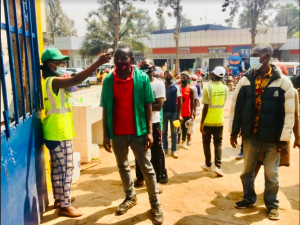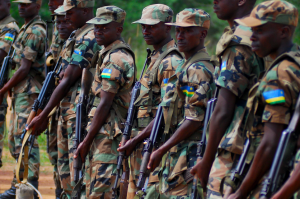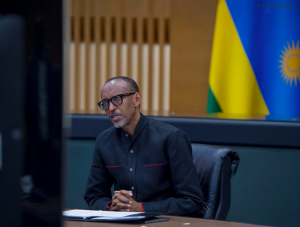By guest contributor & HRSMA alumnus Dr. Laine Munir
The Rwandan capital’s military compound of Camp Kigali, once the site of tragic violence during the 1994 genocide against the Tutsi, is now a site for saving lives during the omicron variant of COVID-19. It is Rwanda’s leading vaccination site that undergirds the country’s impressive success in managing the pandemic. There have been fewer than 1,400 COVID deaths in the second most population-dense country in Africa. Daily infections continue to decrease, thanks mainly to Rwanda’s swift response to social distancing measures and its capacity to build on its foundational pre-pandemic vaccination programs (WHO 2021). Over 30% of the total population has been vaccinated to date, more than twice the continent’s rate as a whole, and booster shots are currently available (Kyobutungi 2021). These are not only remarkable public health outcomes but also a statement on national security. The Rwandan National Police and the national army, the Rwanda Defense Force (RDF), have a ubiquitous presence that has expanded in response to pandemic management.

Paul Kagame’s strong security apparatus developed primarily due to anti-government opposition, small arms smuggling, and drug trafficking. Yet, it currently aids in enforcing public mask use, collective gathering limits, lockdowns, and quarantines. Police and soldiers regularly fine and hold those violating mask mandates at the national stadium, arrest party-goers breaking curfew, assist in contact tracing, and maintain borders around collective quarantine sites.We can think of this use of state security capacity as the “militarization of public health.” It galvanizes pre-existing security structures, processes, technology, and actors to contain a virus rather than armed threats to peace. This was previously evident in Rwanda’s response to the Ebola threat from the DRC, in which the government stemmed cross-border traffic in the summer of 2019. Some argued that it stopped Ebola from entering Rwanda from the Congolese city of Goma and thus hindered not only the spread of disease but also illegal border crossings and resulting anti-migrant sentiments. During COVID, Rwanda joins countries such as Brazil, Peru, Indonesia, Pakistan, and Iran in having a military-led response. Gibson-Fall (2021) refers to this pattern of military engagement in public health as the “rise of the global health security paradigm.”

Pandemics are a national security issue because they destabilize populations. For direct security actors, many of their measures require physical proximity and long-distance movement, which we must limit during the spread of viruses and diseases. Fear of infection can limit military responses to international and external threats, including if armed forces become infected themselves. Healthcare costs may detract from expenditures on traditional security measures–training programs, salaries, equipment and technology—compromising overall capacity for maintaining peace. Oshewolo and Nwozor (2020) explore some of these interplays between public health and collective safety.
Furthermore, national security is also vulnerable to the economic shocks resulting from pandemics like COVID. Increased poverty is linked to outbreaks of civil unrest, particularly among those who believe in resource-driven conflicts, i.e., environments with too little for too many people. According to Okunlola and Okafor (2020), although poverty is not a prime cause of conflict, poverty has “stimulated conflict” in Africa since 1980.
It is widely assumed that unemployment rates, which increased with the pandemic’s business closures, may correlate with higher violence rates in various contexts (Cilliers 2018). Everyone needs to forecast their financial future to make rational decisions beneficial to individual and group outcomes. Economic instability caused by public health crises makes such forecasting a challenge.
Additionally, the stalwart Rwandan state apparatus serves a symbolic function that regulates individual decisions to limit the spread of COVID. The security sector fosters a deep culture of legality and rules obedience across the country; few Rwandans defy the federal government. Coupled with the immense sense of accountability to communal norms and behaviors, the widespread adherence to government advisories means most Rwandans comply with government health directives.

However, some argue there could be a heavy cost to countries using militarized security capacities to contain COVID. When populations are afraid of those supposed to be stemming the spread of disease, they could be more inclined to hide their movements from surveillance and use unofficial transport routes. Alex de Waal (2014) finds a militarized response to disease outbreaks more expensive and less effective than their humanitarian counterparts and reminiscent of coercive medicine under colonial rule. He calls a militarized disease response alarmingly authoritarian, ominous for public health, and strategically counterproductive. The impacts of such reactions to public health vulnerabilities in Africa need to be measured further. In this holistic sense, the COVID-19 response is a test of overall state capacity. All nations, especially developing ones, are right to approach COVID as a public health and safety threat, as Rwanda’s leadership does. However, a military’s ability to command public health remains complex. It permits efficient responses while possibly weakening citizen rights and, thus, collective trust that is helpful to pandemic management. Militarized national responses to COVID reinforce policy and practice linkages among health and armed security actors, upholding militaries as public health agents.
Dr. Laine Munir is an alum of the M.A. in Human Rights Studies program at Columbia University (2008), and is an Assistant Professor of Global Challenges at African Leadership University in Rwanda.
Photos*
Featured Image: By Dr. Laine Munir
“090116-F-1936B-038” by TORCH MAGAZINE is licensed under CC BY-NC 2.0.
“Extraordinary China-Africa Summit on Solidarity against COVID-19 | Kigali , 17 June 2020” by Paul Kagame is licensed under CC BY-NC-ND 2.0.”
